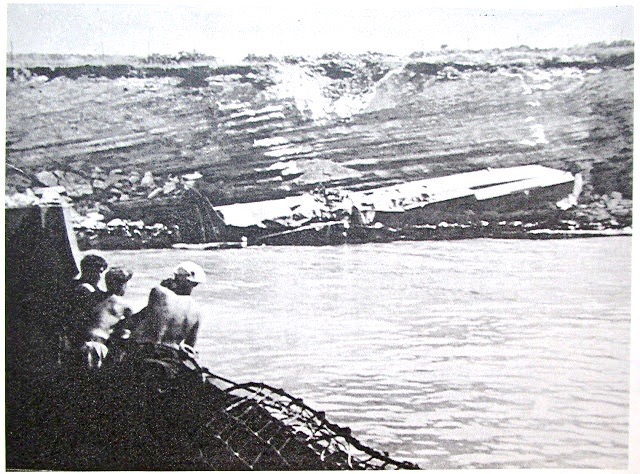Airborne Mishaps Off The Sicilian Coast
By David J. Lewis, RCNVR, Combined Operations
"The crew in one of our LCMs approaching the site of a glider crashed against
the cliff near the Noto landing beach." Photo Credit - D. J. Lewis, as found at
Since taking this picture, and (breathing in) the dreadful smell that went with it, fifty-two and one-half years have passed. The experience remains uncomfortably vivid. However, I have continued to wonder why this particular glider pilot had come in a few feet below the top of the cliff side. Answers have been various. Either he had been gliding too low, too slow, too heavy laden or had he hit a last minute down draft? However, he struck the cliff and collapsed everybody and everything against it into a heap at the water line; a tragic mass of metal, wood and aviation fabric interspersed with human remains.
Further out to sea we could see (drowned) soldier comrades hovering like mermen in the greeny blue depths of the clear Mediterranean waters. Down there they seemed to keep station until internal gas brought them to the surface at irregular intervals during the first fortnight after the Sicilian landings. Then they were towed over to the landing beach where their dog tags were noted and they went to a permanent or temporary grave.
...Admiral J. C. O'Brien wrote: "We were just in time to see the stream of DC3s towing gliders with the airborne troops - the parachutists, I suppose, were ahead of them - coming in over this large convoy where, being American ships, they'd all been issued with 20mm guns. The cry in our navy was that the Americans got a dollar for every time they loosed off a magazine. And they just filled the sky, with the result that we saw the lead aircraft start pulling the plug early and saw the gliders go into the otherwise very successful landings in Sicily." (Page 169, Salty Dips, Vol. 2)
O,Brien's Salty Dips matches up with personal experiences working off the Noto invasion beaches of Sicily in the month of July 1943 subsequent to the landings. We had morning and nightly visits from Axis bombers which were greeted with very heavy fire from US ships and sometimes requests for more ammunition because all theirs had been shot away in the course of their first night off the landing beach. Meanwhile the anchorage was showered with their canon shells and AA shrapnel.
At that time the 80th Flotilla was fortunate in a sort of a kind of way because they had found a cave on one of their beaches in which, if they cared, they could take shelter. The down side was that the cave had been home to generations of livestock who were not given to cleaning up after themselves.
The 81st LCM Flotilla's night off duty quarters were in the bare boats, for the most part unprotected. No better protected were those who dug themselves a vertical slit trench or slung their hammocks between almond trees in a neighbouring orchard...
More details about the above excerpt, and its conclusion can be found at this link, St. Nazaire to Singapore, Vol. 1, pages 181 - 182.
At Avola and Noto beaches: The proximity of Axis airports and the stretched
defensive distance of the Allies resulted in the heaviest and most prolong experience of
bombing. A distant stick of bombs is seen on the horizon. Photo - D. J. Lewis, pg. 183
The Morning After: The twisted upper works of the burning Liberty Ship bombed
at Noto Beach, now resting on the bottom. Photo Credit - D. J. Lewis, pg. 185
Related observations concerning the glider assault force by Leading Seaman D. Harrison of the 80th Flotilla, at Avola Beach (found at Memoirs, Ch. 7 - Sicily):
A signal came through, i.e., ‘do not fire on low flying aircraft, they are ours and towing gliders.’
What, in the dark?
Next morning, as we slowly moved in (on Landing Craft Mechanized, LCMs), we saw gliders everywhere. I saw them sticking out of the water, crashed on land and in the vineyards. In my twenty-seven days there I did not see a glider intact.
As well, please link to Short Story re Malta, "Rest and Repair, August 1943"
As well, please link to Short Story re Malta, "Rest and Repair, August 1943"



No comments:
Post a Comment